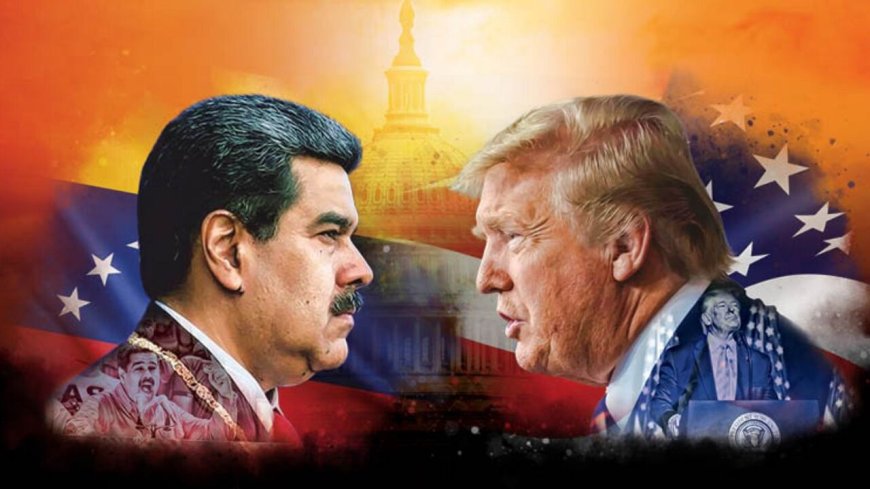The Empire’s Sanction Machine: What Happens When a Superpower Runs on Crude Tactics?
At the heart of Trump’s approach lay a key objective: securing America’s energy independence. With the surge in shale oil production and the transformation of the U.S. into one of the world’s largest energy producers and exporters, Washington significantly reduced its reliance on imported oil, particularly from Venezuela and the Middle East.

Donald Trump’s return to the White House marked the intensification of Washington’s maximum pressure strategy against Venezuela. Built upon the foundation of U.S. energy independence and weaponization of energy policy, these measures aimed not only at crippling Nicolás Maduro’s government but also reflected the enduring colonial impulses of U.S. foreign policy toward sovereign nations.
At the heart of Trump’s approach lay a key objective: securing America’s energy independence. With the surge in shale oil production and the transformation of the U.S. into one of the world’s largest energy producers and exporters, Washington significantly reduced its reliance on imported oil, particularly from Venezuela and the Middle East.
This newfound confidence granted Washington the audacity to impose aggressive measures on oil-producing nations that did not align with U.S. interests. In Venezuela’s case—home to the world’s largest proven oil reserves—this independence enabled the Trump administration to launch sweeping sanctions on its oil industry without fearing domestic energy market disruption.
The Trump administration explicitly weaponized energy to pressure the Maduro government. Beginning in 2017, and particularly after recognizing Juan Guaidó as interim president in January 2019, the U.S. sharply escalated sanctions against Venezuela’s state-run oil company and related sectors.
These sanctions included a ban on Venezuelan oil imports, secondary sanctions on companies engaging with Caracas, and freezing of Venezuelan assets in the U.S. Analyses published in late 2024 and early 2025 affirm that while these sanctions pushed Venezuela’s economy to the brink—slashing oil production from over 2 million barrels per day to under 1 million—they ultimately failed in their core objective: toppling the Maduro government.
Trump’s pressure campaign persisted into his second term, culminating in Executive Order 14245, which imposed a 25% tariff on all imports from countries purchasing Venezuelan oil.
Trump’s Venezuela policy clearly signaled a regime-change agenda via economic strangulation and veiled military threats. Although direct military intervention has not materialized, the use of crushing sanctions, threats of force, and overt support for opposition groups reveals a coercive strategy aimed at engineering political transformation through brute pressure.
This approach echoes the U.S.’s long-standing tradition of colonial-style interventionism in Latin America. Sanctions, economic threats, and backing dissident factions have all been part of the U.S. playbook for undermining independent governments. Such tactics not only erode national sovereignty but also destabilize the broader region.
The consequences of Washington’s maximum pressure campaign on Venezuela have been far-reaching:
Humanitarian and Migration Crisis:
The economic collapse—exacerbated by U.S. sanctions—triggered one of the largest migration crises in the Western Hemisphere. Millions of Venezuelans fled to neighboring countries such as Colombia, Peru, Ecuador, and Brazil, overwhelming their already strained public services.
Empowering U.S. Rivals:
Isolating Venezuela pushed it into powers such as Russia, China, and Iran. These nations have provided financial, military, and technical support to Maduro’s government, sidestepping U.S. sanctions and expanding their regional influence.
Regional Divisions:
The U.S.'s hardline stance deepened rifts across Latin America. While some right-leaning governments backed Washington’s approach, others condemned it as meddlesome and in violation of international law—complicating efforts to reach a unified regional resolution to the Venezuelan crisis.
Undermining Multilateral Institutions:
The Trump administration’s unilateralism and disregard for institutions such as the United Nations and the Organization of American States weakened these bodies and diminished their credibility in resolving global conflicts.
Caracas labeled Trump’s policies as an "economic war" and signaled its intent to deepen oil partnerships with China and Russia—countries that have denounced U.S. sanctions and thrown their support behind Venezuela. This dynamic underscores a widening chasm between the United States and other global powers regarding Washington’s interventionist doctrine.
In essence, Trump’s energy policy toward Venezuela exemplifies the use of energy as a geopolitical cudgel. Grounded in the rhetoric of independence but driven by the ambition for regime change, these policies have not only invited domestic and international backlash but have also risked escalating regional instability and geopolitical confrontation.
*Translated by Ashraf Hemmati from the original Persian article written by Mohammad Saleh Ghorbanie












































